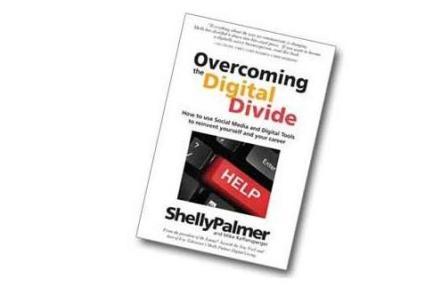"Overcoming the Digital Divide: How to Use Social Media and Digital Tools to Reinvent Yourself and Your Career" - An Excerpt from the Introduction - Shelly Palmer and Mike Raffensperger

That Which Does Not Kill Us Makes Us Stronger
This is my favorite way to paraphrase Friedrich Nietzsche's famous quote "Was ihn nicht umbringt, macht ihn starker" (What does not kill him, makes him stronger). It doesn't matter how you like to say it, it's a remarkable perspective on the value of your experience. You may be a little "long in the tooth" or just an old soul, but the fact that you are still here says something extraordinary about you. You survived, you're relatively healthy, you're of sound mind (more or less) and you're thinking about your future. These are very good things.
We're going to use every bit of your experience to plan your future. Every boss who tortured you, every co-worker who screwed you, every vendor who let you down, everything bad that has ever happened in your career has made you stronger. Believe it ... it is the truth.
Of course, the good experiences are as big a part of who you are as the bad. But it is the bad experiences, the mistakes and the battles (both won and lost), that you will use to your advantage now.
Your previous experiences will allow you to make "new" mistakes instead of "old" ones. Grown-ups who have attained a "certain age" have the luxury of having made a zillion errors of varying sizes and complexities over the course of their careers. The new kid, 20 years your junior (who is looking for your job), has not had the pleasure of screwing up big time and living to tell about it.
You Don't Need to Be the Fittest, Just the Most Adaptable
"Survival of the fittest" is a misinterpretation of the thesis of Charles Darwin's 1859 classic, "On the Origin of Species by Means of Natural Selection." It is much better described as "survival of the most adaptable." All things being equal, being the fittest may make you more likely to pass on your genes to future generations (which is what natural selection is all about). But being the most adaptable makes you more likely to survive extraordinary circumstances that might otherwise kill you (thereby preventing you from passing on your genes at all). The very definition of a survivor is someone who had the ability to adapt to unanticipated (sometimes catastrophic) change and lived to tell the tale.
How many of us have reacted to outside stimuli and lived to tell about it? Of course, this rhetorical question applies to the lessons from our buddy Nietzsche as well. But, in this case, I'm talking about decisions (good or bad) that you may have made during your career that, in hindsight, changed the course of your life. If you go back and make a list of them – there shouldn't be more than a handful – you will be amazed at how random they seem on paper. Following a significant other someplace, meeting someone at a bar, seeing an ad in the paper, hearing about an opportunity from a friend – the list is virtually endless. Random, but endless.
How remarkable is it that anyone thinks they can control their destiny? I'm not talking about divine intervention; I'm simply stating the obvious: small random decisions are responsible for an inordinately large proportion of how our personal futures unfold.
I bring this up because I want you to understand that reinventing yourself and your career is a conscious decision that will require a serious commitment. We are going to use what you already know, to be sure. But we are also going to spend time accumulating new knowledge and new techniques. More importantly, we are going to learn how to analyze problems with the specific intention of using your newly acquired skills to solve them.
This actually needs a little more clarification. I could teach an average 11th grader enough calculus to solve a calculus problem. Math teachers do this in high schools all over the world every day. On the other hand, you would need a very different kind of mathematical training to observe the real world, see a problem and understand that calculus is the appropriate mathematical tool to solve it. This is not a subtle point. You could memorize the pages in this book, and the tools, tips and techniques might be of some help. However, if you bring your experience to these pages and approach the digital world as if it were no different than the world you experience every day, you will come away with basic skills you need to recognize problems that can be solved with digital tools. And with a little practice, you will understand how to break those problems down into action items that you can cover or feel comfortable managing.
What We Can Learn from Yoda
I love Yoda. He is by far my favorite sage. While I must admit I was a little bummed when he couldn't kick the Emperor's butt in Episode III, that doesn't take away from his formidable Jedi wisdom. "There is no try É only do or do not," says the Jedi Master to Luke Skywalker. Luke babbles some candy-ass excuse about his spacecraft being too big, and Yoda admonishes, "And that is why you fail."
The only problem with pop-culture psychobabble is that it makes people believe that there are simple, wizened phrases that, if adhered to, will change your life. This assumption is patently wrong!
"Believe in yourself." "There is no 'I' in Team." "When one door closes, another door opens." Who writes this stuff? Pop-culture psychobabble (like you find in self-help books) really can't change your life. Only you can do that. (Wow, even that sounds like pop-culture psychobabble.)
Reinventing yourself is very hard work. It requires you to spend a great deal of time out of your comfort zone. Just to complete our cliché paragraph: If it were easy, everyone would do it. So, make Yoda proud and fully commit to overcoming the digital divide. It will be a giant step toward translating the value of your accumulated intellectual property into wealth.
"Overcoming the Digital Divide: How to Use Social Media and Digital Tools to Reinvent Yourself and Your Career" - An Excerpt from the Introduction
Shelly Palmer is the host of MediaBytes with Shelly Palmer, a daily show featuring news you can use about technology, media & entertainment. He is the author of Television Disrupted: The Transition from Network to Networked TV (2008, New York House Press) and the upcoming, Get Digital: Reinventing Yourself and Your Career for the 21st Century Economy. (2009, Lake House Press). Shelly is also President of the National Academy of Television Arts & Sciences, NY (the organization that bestows the coveted Emmy Awards). For information about Get Digital Classes, visit http://www.shellypalmer.com/seminars.Watch Digital Life with Shelly Palmer Tuesdays at 10p ET on WNBC's NY Nonstophttp://www.shellypalmer.com/digitallife.
Read all Shelly's MediaBizBloggers commentaries at Shelly Palmer Report.
Check us out on Facebook at MediaBizBloggers.com
Follow our Twitter updates @MediaBizBlogger
MediaBizBloggers is an open-thought leadership blog platform for media, marketing and advertising professionals, companies and organizations. To contribute, contact Jack@mediadvisorygroup.com. The opinions expressed in MediaBizBloggers.com are not those of Media Advisory Group, its employees or other MediaBizBloggers.com contributors. Media Advisory Group accepts no responsibility for the views of MediaBizBloggers authors.


